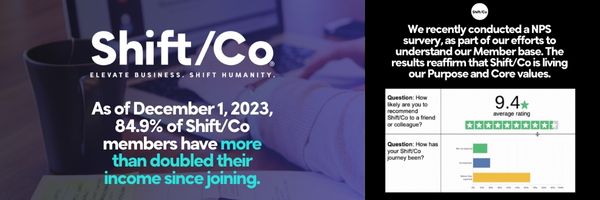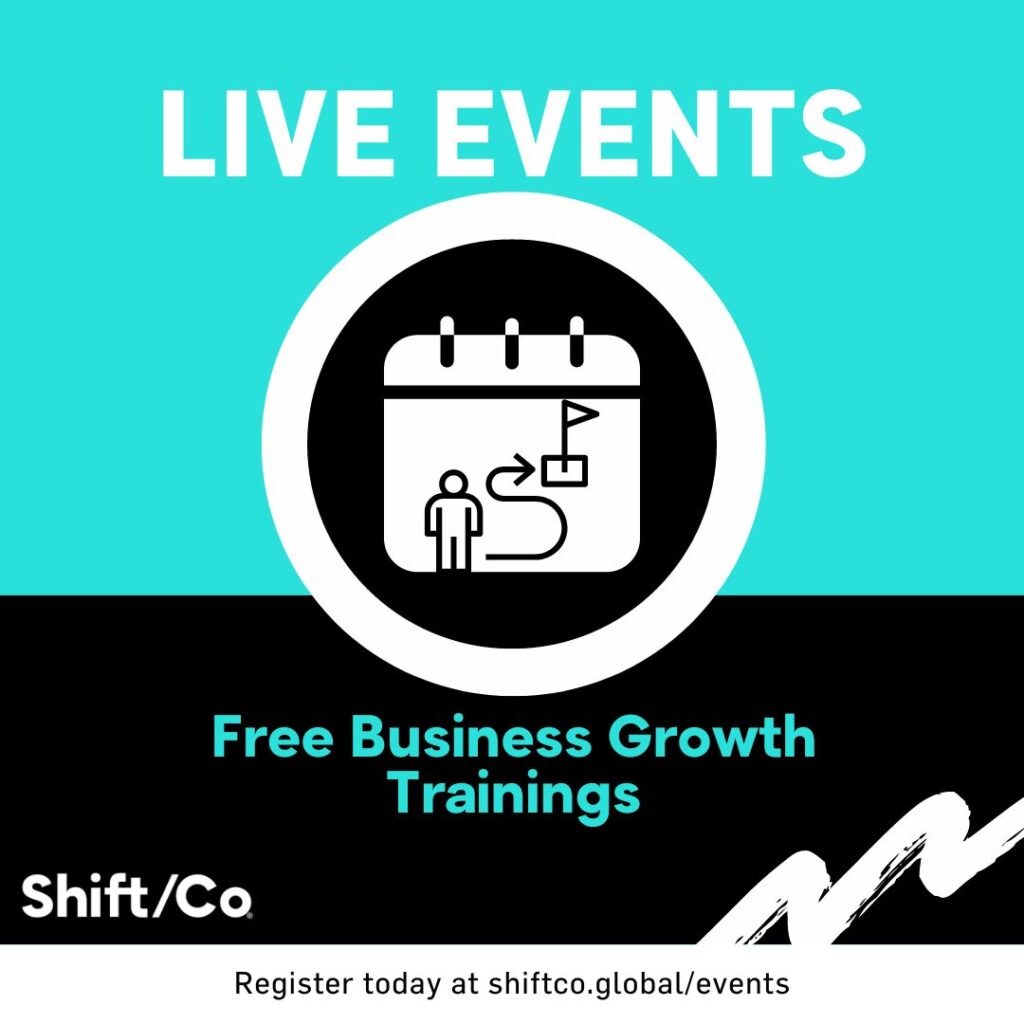For many service-based businesses, especially those led by conscious entrepreneurs, referrals are often the bedrock of early success. Word-of-mouth can provide a steady stream of clients, especially in the early stages of your business. However, at a certain point, relying solely on referrals can limit your growth potential and your ability to make a broader impact.
So, what comes next? How do you take your conscious business beyond the comfort zone of referrals and into sustainable, scalable growth?
The Limitations of Referrals: Why You Need More for Sustainable Business Growth
Referrals are a great way to build trust and gain initial clients, but they’re not always reliable for long-term business growth. Here’s why:
- Referrals Can Plateau: Once you’ve tapped into your immediate network, you may find that referrals slow down or become sporadic. You can’t predict when your next client will come through the door.
- Limited Reach: Relying solely on referrals keeps you within a certain circle. If you want to reach new markets, industries, or demographics, you need to broaden your approach.
- Scaling Impact: For conscious entrepreneurs, scaling your business often means scaling your impact. To reach more people and further your mission, you need a growth strategy that goes beyond word-of-mouth.
It’s time to think bigger. Let’s explore how demand generation can help you grow your business and your impact.
What is Demand Generation, and Why is It Essential for Conscious Entrepreneurs?
Demand generation is the process of creating awareness and interest in your business to drive new leads and opportunities. It’s about positioning your business in front of the right audience and consistently generating demand for your services.
For conscious entrepreneurs, demand generation is particularly important because it allows you to educate your audience, build trust, and create a steady stream of potential clients—without compromising your values. It’s not just about attracting more clients; it’s about attracting the right clients who align with your mission.
So, what are the key demand generation strategies conscious businesses can implement?
1. Building a Content Marketing Ecosystem
Content marketing plays a critical role in demand generation. It’s about creating a comprehensive ecosystem of content that educates, engages, and converts your audience. This can be your website copy, landing pages, blog pages, email copy, social media content, podcasts, online webinars.
Why Content Marketing Works for Conscious Businesses
Content marketing allows you to showcase your expertise while staying authentic to your mission. It’s an opportunity to educate your audience on the issues your business solves, whether it’s sustainability, ethical practices, or social impact.
Key Content Strategies for Conscious Entrepreneurs
- Thought Leadership Articles: Publish articles that dive deep into topics relevant to your industry. For example, if you’re a sustainability consultant, write about the latest trends in eco-friendly business practices.
- Case Studies: Highlight success stories that show how your service has positively impacted clients and their communities. This not only builds credibility but also creates an emotional connection with potential clients.
- Educational Webinars: Hosting webinars is a great way to engage with your audience. Choose topics that resonate with your potential clients, such as “How to Build a Sustainable Business Model” or “The Impact of Conscious Entrepreneurship on Society.”
Lead Generation Through Content
To turn content into leads, offer valuable resources in exchange for contact information. For example, create a downloadable guide or eBook on a topic your audience cares about. This helps you build an email list and nurture leads over time.
2. Leveraging Partnerships and Collaborations for Demand Generation
Partnerships are a powerful way to expand your reach and drive demand for your services. By collaborating with like-minded businesses or influencers, you can tap into new audiences that may not have heard about your business otherwise.
How Partnerships Can Benefit Conscious Entrepreneurs
- Broaden Your Audience: Partnering with complementary businesses allows you to reach their audience as well. For instance, if you’re a wellness coach, you could collaborate with a local organic food brand to co-host a webinar on holistic health.
- Build Credibility: When you partner with reputable brands or influencers in your industry, it adds a layer of trust and credibility to your business.
Ideas for Strategic Collaborations
- Co-hosted Webinars: Team up with another conscious entrepreneur or business to host a webinar on a shared topic of interest. For example, a sustainability consultant might partner with an eco-friendly packaging company.
- Guest Blogging or Podcasting: Write guest blog posts for websites with a similar audience or appear as a guest on industry podcasts to share your expertise.
- Cross-Promotions: Partner with businesses in your niche to cross-promote each other’s services on social media or email newsletters.
3. Paid Advertising: Conscious Ads That Drive Demand
While paid advertising may seem contrary to the ethos of a conscious business, it can be a highly effective and ethical way to grow your business—if done thoughtfully. Paid ads can help you reach a broader audience and generate demand for your services, especially when used to promote valuable content rather than just pushing sales.
Where Should Conscious Businesses Advertise?
- Google Ads: Target specific search queries that align with your service. For example, if you offer eco-consulting services, target searches like “sustainable business consulting” or “green business practices.”
- Social Media Ads (Facebook, Instagram, LinkedIn): These platforms allow you to target users based on their interests and behaviors. For instance, you can target people who follow sustainability influencers or are part of conscious business groups.
Ethical Ad Copy That Converts
When creating ads for your conscious business, focus on the value you provide rather than pushing a hard sell. Highlight how your services align with the audience’s values and how you can help them achieve their goals, whether that’s saving the environment, improving their well-being, or supporting ethical practices.
Join us for our FREE virtual business events tailored specifically for purpose-driven entrepreneurs like you. Learn how to grow your impact, attract aligned clients, and build a thriving business—all while making a difference.
4. Networking and Speaking Engagements
As a conscious entrepreneur, networking and public speaking can be powerful tools for demand generation. By positioning yourself as a thought leader, you can attract clients who are aligned with your mission and values.
How Networking Can Expand Your Reach
- Attend Industry Events: Look for conferences or virtual summits focused on conscious entrepreneurship, sustainability, or ethical business practices. These events are excellent opportunities to meet potential clients and collaborators.
- Join Networking Groups: Many cities have conscious business groups or networking events where like-minded entrepreneurs gather to share ideas and opportunities. Attend these to build relationships and increase your visibility.
- Online communities & groups: There’s also an endless list of communities within the social media platforms. Checking in these groups on a regular basis can often lead to a string of conversations around your business offerings.
Speaking Engagements to Showcase Your Expertise
- Offer to Speak: Reach out to event organizers and offer to speak on topics relevant to your expertise. Whether it’s a panel discussion or a webinar, speaking engagements allow you to position yourself as an authority in your field.
- Host Your Own Events: If you can’t find speaking opportunities, create your own! Host a local or virtual workshop on a topic that resonates with your audience, like “How to Build a Conscious Business from the Ground Up.”
5. Nurturing Leads from Awareness to Conversion
Generating demand is only half the battle. Once you’ve captured a lead’s attention, you need to nurture them through the buying journey.
Lead Nurturing Strategies for Conscious Entrepreneurs
- Email Marketing: Build a relationship with potential clients by sending regular, value-driven emails. Share educational content, client success stories, and free resources.
- Retargeting Ads: Use retargeting ads to reach people who have previously visited your website or engaged with your content. These gentle reminders can bring them back to take the next step.
- Personalized Follow-ups: Don’t be afraid to reach out personally. A well-timed email or phone call can go a long way in converting leads.
Conclusion: Moving Beyond Referrals for Sustainable Business Growth
Referrals are a great start, but they can only take your conscious business so far. By implementing demand generation strategies like content marketing, partnerships, paid advertising, and speaking engagements, you can create a steady flow of new leads while staying true to your mission.
As a conscious entrepreneur, building a business with authenticity and purpose doesn’t mean you have to sacrifice growth. In fact, the more you grow, the bigger your impact can be. So, what’s your next step to scaling your business and maximizing your positive influence?
Shift/Co is a place where Founders gather to grow.
Shift/Co is a global community dedicated to conscious business growth. We empower entrepreneurs to grow their businesses through innovative tools, expert coaching, and a supportive network. Our comprehensive approach includes personalized training, leadership development, and a collaborative environment, ensuring that members can achieve significant business growth while positively impacting the world. Join Shift/Co to elevate your business and be part of a movement that believes in doing good business better. For more information, visit Shift/Co.



